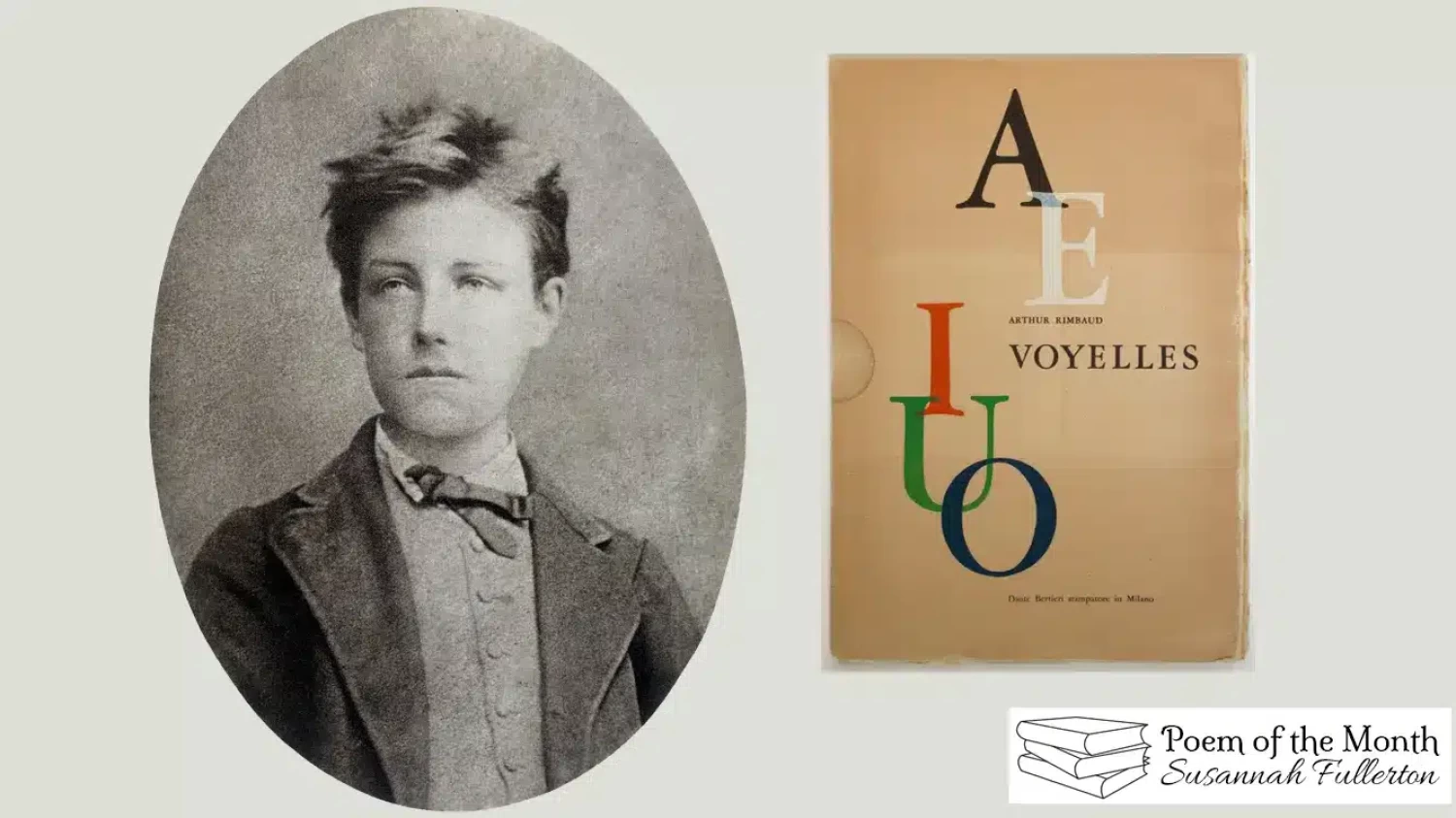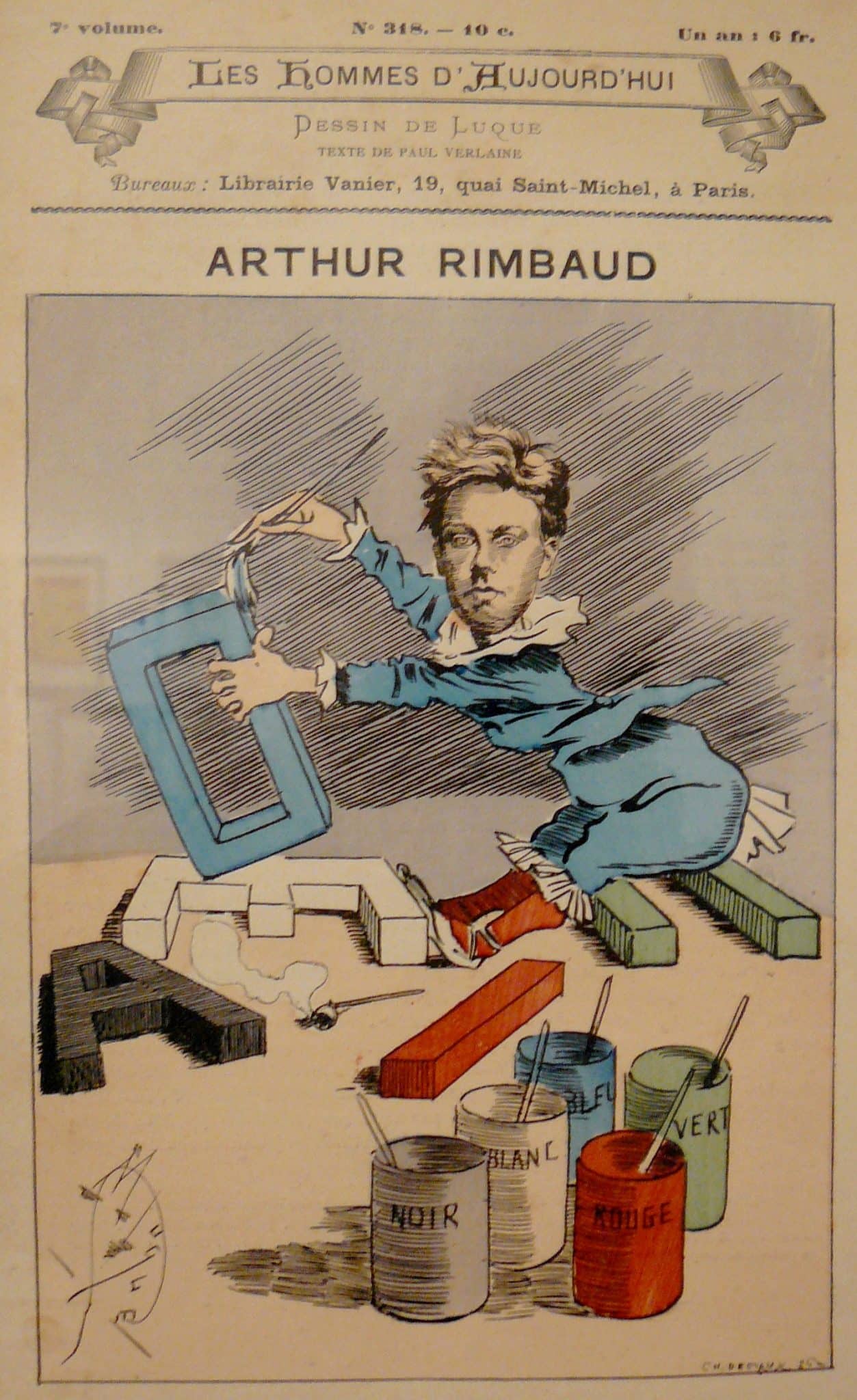Some years ago, I included a French poem in my newsletter, Déjeuner du Matin by Jacques Prévert. It has been one of the most popular items in my newsletter ever, so this month I’m offering you another fascinating French poem, along with an English translation.
Voyelles by Arthur Rimbaud
A noir, E blanc, I rouge, U vert, O bleu: voyelles,
Je dirai quelque jour vos naissances latentes:
A, noir corset velu des mouches éclatantes
Qui bombinent autour des puanteurs cruelles,
Golfes d’ombre; E, candeurs des vapeurs et des tentes,
Lances des glaciers fiers, rois blancs, frissons d’ombelles;
I, pourpres, sang craché, rire des lèvres belles
Dans la colère ou les ivresses pénitentes;
U, cycles, vibrements divins des mers virides,
Paix des pâtis semés d’animaux, paix des rides
Que l’alchimie imprime aux grands fronts studieux;
O, suprême Clairon plein des strideurs étranges,
Silences traversés des [Mondes et des Anges]:
—O l’Oméga, rayon violet de [Ses] Yeux!
. . . . . .
A black, E white, I red, U green, O blue: vowels,
I shall tell, one day, of your mysterious origins:
A, black velvety jacket of brilliant flies
which buzz around cruel smells,
Gulfs of shadow; E, whiteness of vapors and of tents,
lances of proud glaciers, white kings, shivers of cow-parsley;
I, purples, spat blood, smile of beautiful lips
in anger or in the raptures of penitence;
U, waves, divine shudderings of viridian seas,
the peace of pastures dotted with animals, the peace of the furrows
which alchemy prints on broad studious foreheads;
O, sublime Trumpet full of strange piercing sounds,
silences crossed by [Worlds and by Angels]:
–O the Omega! the violet ray of [His] Eyes!
This sonnet was written in 1871, although only published in 1883 (when Rimbaud’s friend/lover Paul Verlaine arranged for its publication). Symbolist poet Rimbaud (1854 – 1891) was only sixteen when he wrote it. It remains one of his most discussed poems – indeed, it has been written about more than almost any other poem in the French language. It appears frequently on the school syllabus in France.
The poem’s theme is the different characters of the five vowels, each one associated with colours (although the vowels are not quite in correct alphabetical order). Perhaps it drew on memories of coloured cubes marked with letters of the alphabet that Rimbaud played with as a child? Does it draw on cabbalistic literature? Or is it an erotic poem? Or one based on a psychedelic experience?
Rimbaud is perfectly aware that he is mystifying his readers: “I shall tell, one day, of your mysterious origins” … then he mockingly refuses to explain. Rimbaud was influenced by fellow French poet Charles Baudelaire, whose poem Correspondences defined synaesthesia, or the linking of sensations of different senses. Voyelles is a poem that balances the playful with the enigmatic, showing the power of language to act as a transmutative force.
The poem has inspired composers who have set it to music, and has influenced other writers such as John Ashbery, Julian Barnes and Samuel Beckett. Artists have illustrated it.
You can listen to this poem read in the beautiful French language:
Or, here in English:
Have you enjoyed this poem? I’d love to know what you think, let me know by leaving a comment.
Selected links for relevant websites, books, movies, videos, and more. Some of these links lead to protected content on this website, learn more about that here.

